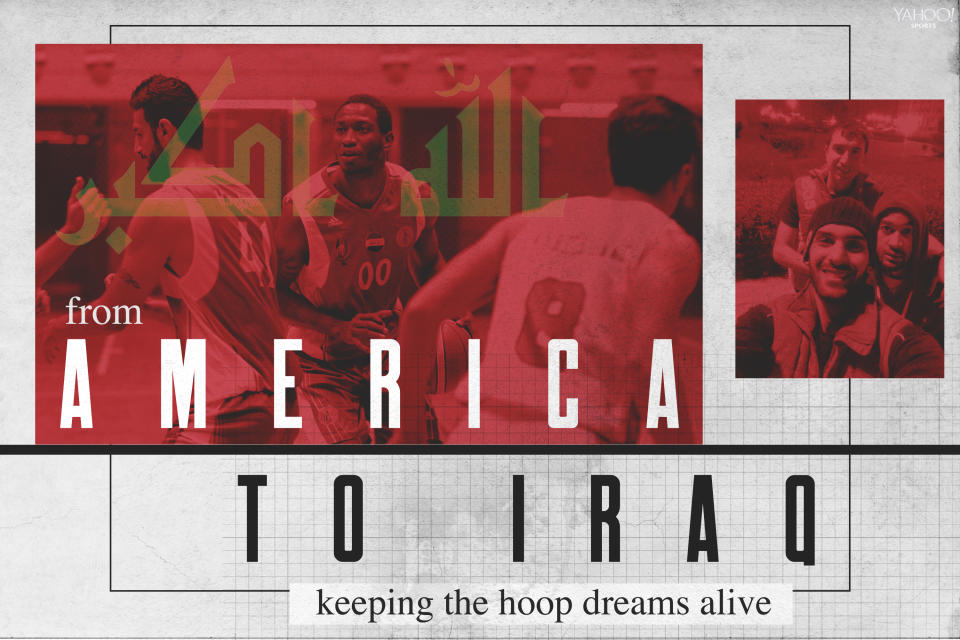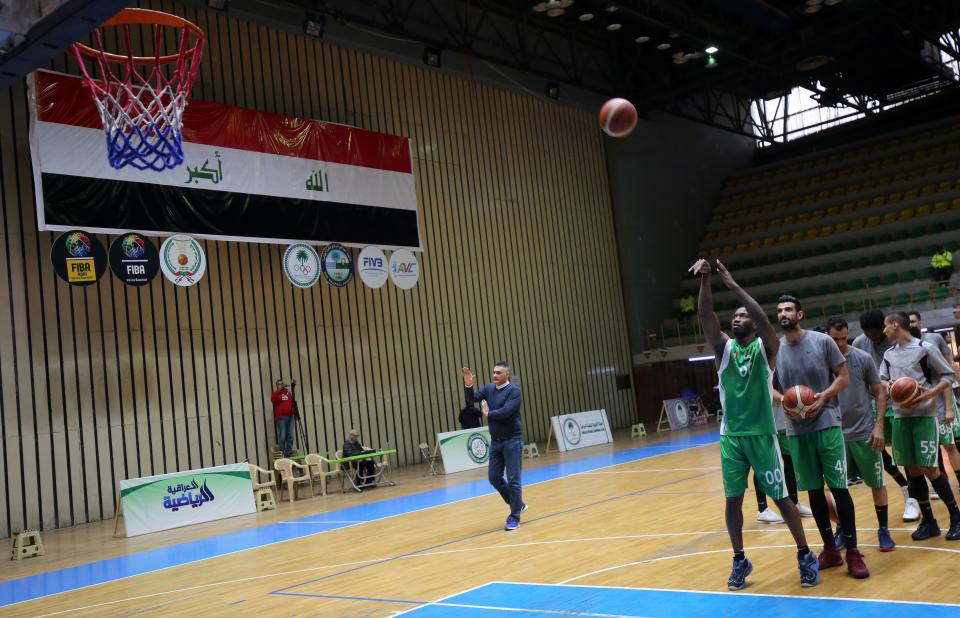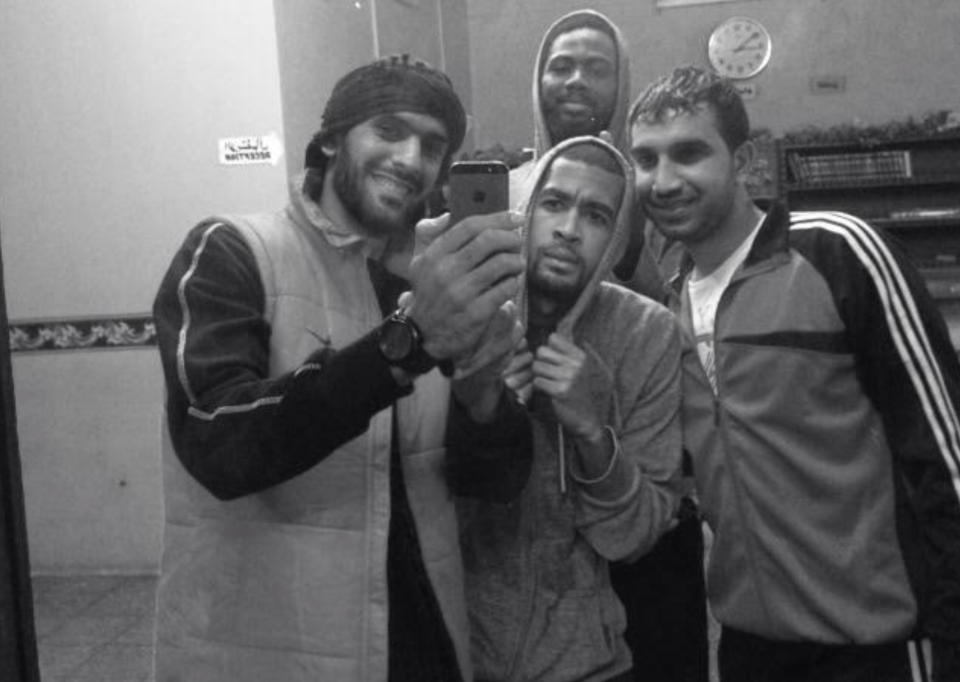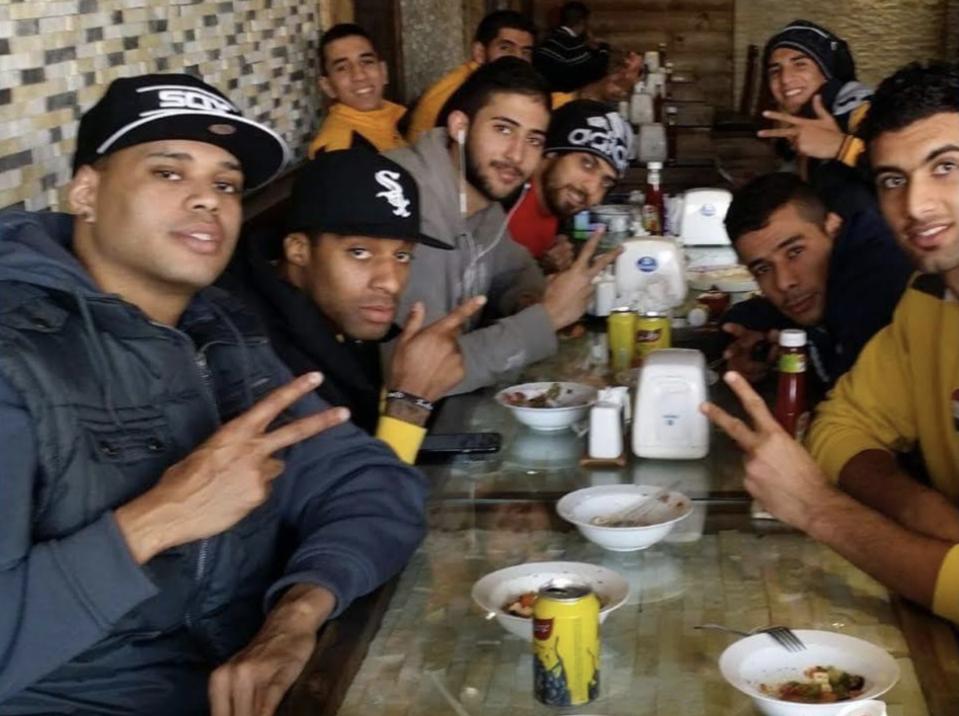Long-distance shot: Why some Americans risk playing professional basketball in Iraq

Already unsure how much longer he was willing to risk living in a city widely regarded as one of the most dangerous on Earth, Joel Box finally reached his breaking point.
A car bomb exploded near Baghdad’s biggest mall as Box and a teammate were approaching the entrance, knocking the two American professional basketball players to the ground, sending motorists scrambling from their cars and scattering dust and debris in every direction.
Box had come to Iraq’s war-weary capital city four months earlier as much by accident as by choice. When an Iraqi club offered the 6-foot-8 forward a contract for the 2013-14 season, the agent who brokered the deal mistakenly told Box the team was based to the north in Erbil, an ethnically and religiously diverse city with a burgeoning tourism industry and markedly less risk of terrorism.
Not until late in the team’s 12-day training camp in Tunisia did Box learn Al-Karkh SC’s actual location. When a team official handed him a plane ticket to Iraq, the destination wasn’t Erbil. It was Baghdad International Airport.
“I didn’t even think there was basketball in Baghdad. That never really crossed my mind at all,” Box said. “I always researched teams before I signed, but this time I didn’t do enough digging. I tried to reach out to other guys I knew who played in Iraq, but they all had only played in Erbil. I thought that was the only place in Iraq that anybody played because that was the safest part of the country.”
Fearful that other foreign clubs would have no money or roster space left for American imports so close to the start of the new season, Box reluctantly chose playing in Baghdad over risking prolonged unemployment.
The former standout center at Division II Quincy University had scraped together a six-year professional career playing for modest wages in leagues across the Middle East. He wasn’t in position to turn down a salary of $8,000 per month, nor did he want to give teams reason to question his health by taking a year off from basketball just months removed from suffering a torn meniscus.
It didn’t shake Box’s resolve that Al-Karkh SC initially housed him in a cramped apartment with blasted-out windows. Or that the club insisted Box and his American teammates take a different route to practice each day to reduce the threat of becoming targets of a roadside bomb. Or that the rumble of distant explosions became increasingly common as the season went along.
The turning point for Box was the explosion near the mall because for the first time he felt that his own life was in danger. Initially unsure what direction to run or who he could trust, Box eventually took refuge inside a military building behind the mall as the sound of gunfire and smaller explosions echoed in the distance.
“It was terrifying, absolutely terrifying,” Box said. “When it was finally over, I called the manager of the team and told him, ‘Hey listen, this was enough for me. This was way too close. I’m ready to go home.’”
Who are the Americans playing in Iraq?
American professional basketball players whose NBA dreams fizzle typically seek work in tourist-friendly places like Europe, China or Australia, but those whose phones aren’t ringing occasionally traverse a riskier path. They summon the courage to play in Iraq, drawn by an adventure-seeking spirit, the desperate desire to extend their basketball careers and salaries that compare favorably to paydays available in other far-flung leagues around the world.
About four dozen Americans have played in Iraq since the country’s state-run basketball league opened its doors to foreign imports six years ago. Most are little-known former lower-division college players still trying to gain a foothold in professional basketball, but the league has also attracted a few recognizable faces trying to recapture their former glory.
Hard-partying former Ole Miss star Marshall Henderson spent part of the 2014-15 season with a team in Baghdad after his history of off-court issues dashed his hopes of drawing interest from the NBA or high-level European teams. Ex-UNC Charlotte standout Demario Mayfield came to Iraq in 2015 under even more desperate circumstances, one year removed from spending time in jail after being charged with conspiracy to commit armed robbery.
Well-traveled ex-McDonald’s All-American and University of Miami star Darius Rice accepted a midseason contract offer from a team in Baghdad last January because he couldn’t afford to risk a career-threatening empty year on his résumé. Rice intended to spend the year with a Mexican club, but a torn calf muscle forced him to sit out November and December and then seek other options.
“I told my agent, ‘You sure there’s nothing else open right now?’ ” Rice said. “My mom told me, ‘Hell no!” when I showed her the contract. Pretty much everyone was telling me not to take it, but I just had to do it. When you’re 35, it’s already hard enough to get a job. I can’t have an empty spot on my résumé or it will get even harder.”
Since Iraq’s perpetual instability is a deterrent to landing foreign imports, the country’s pro basketball teams try to combat that with the salaries they offer. Iraqi clubs typically pay Americans between $4,000 and $10,000 per month over the course of a six-month season, sometimes several thousand dollars more for returning players who have proven they can thrive in a war-ravaged country.
Agents with ties to the Middle East put Iraqi clubs in touch with a wide range of American players, but the negative responses typically far outweigh the positive ones. Even those players who do entertain the idea of going to Iraq have a tough time explaining the decision to their family and friends.
“My family pretty much looked at me like I was crazy,” ex-UCF guard Isaiah Sykes said.
“‘Hell no.’ ‘Don’t go over there.’ ‘You crazy?’ I heard it all,” former Mesa Community College forward Gabe Freeman added.
“My mom was really, really scared,” ex-South Alabama swingman Gary Redus Jr. admitted. “You know how moms are.”

Is playing in Iraq safe for Americans?
The major worry most American players have when weighing an offer from an Iraqi club is whether they’ll be safe.
In the 15 years since a U.S.-led invasion plunged Iraq into a cycle of insurgency, dysfunction and war, the country has been plagued by terrorist attacks, civil unrest and ethnic and religious violence. The relentless suicide bombings have abated in Baghdad since last year’s territorial defeat of the Islamic State, but explosions and kidnappings remain all too common for American basketball players to feel secure.
As he waited for the owner of his Iraqi club to pick him up at the airport four years ago, Redus began having second thoughts about where he had chosen to attempt to revive his basketball career. His phone wasn’t working, he had no idea where to go and he felt wholly out of place, a 6-foot-6 black man in basketball shorts and a hoodie surrounded by Iraqis clad mostly in headscarves and robes.
“Longest hour of my life,” Redus said. “I’m not the type of person who gets scared easily, but I was scared.”
Redus had retired from basketball and taken a job at DirectTV in January 2014 when he received a text from his former agent asking if he had any interest in giving the sport one last try. Within days, he was training again and making plans to move to Chicago to play in a semi-pro league there. Not long after that, a contract offer from Iraqi club Al-Tadamon arrived.
Knowing little about Iraq besides what he’d seen on TV, Redus’ initial instinct was not to go. The news media’s emphasis on violence wasn’t exactly reassuring, nor was the U.S. government’s warning to Americans considering visiting Iraq.
The state department says Americans in Iraq are at “high risk for violence and kidnapping” because of the numerous terrorist and insurgent groups active in the country. Before any U.S. citizen visits Iraq, the state department suggests he or she draft a will and discuss a plan with loved ones regarding funeral wishes, care of children and pets and distribution of property and belongings.
Even though many of his family and friends urged him not to go to Iraq, Redus felt the offer was too tempting to pass up. Friends who previously played in Iraq told him he’d be safe as long as he took some precautions.
Many American players in Iraq don’t venture out late at night or without a companion. Others avoid roads notorious for carjackings and kidnappings, and crowded markets and cafes that are commonly bombing targets. And every player is mindful of their conduct when passing through frequent military checkpoints manned by soldiers armed with grenades and assault rifles.
Redus only had one scare during his lone season in Iraq, a cab ride in which his non-English-speaking driver didn’t understand his desired destination, circled Baghdad for 30 minutes and dumped him in a unfamiliar part of the city. Other than that, the Iraqis Redus encountered were so friendly that they changed the perception he had of the country before he arrived.
“People love you over there,” Redus said. “They scream, ‘American!’, wave, run up to you and want to take a picture.
“We think that everyone in Iraq is in ISIS, but my teammates, the owners and a lot of the people I met, they were just as scared of ISIS as Americans are when we see it on the news. They didn’t want ISIS anywhere near them either. They really are just like us.”

Why Americans often struggle adjusting to Iraqi culture
American basketball players who steer clear of the violence in Iraq still seldom have an easy time adjusting to the culture. They typically encounter unfamiliar cuisine, stark linguistic differences and a dearth of entertainment options, all of which sometimes leads to crippling homesickness and isolation.
When his flight arrived in Baghdad last January, Darius Rice craved a comforting meal. The former University of Miami forward was jet-lagged and famished after traveling roughly 20 hours to get from his native Mississippi to Iraq’s capital city, home of his new club, Al-Karkh SC.
Rice texted his new coach on his way to Al-Karkh’s team compound to ask where he could grab some late-night grub. To say the least, the response was not what he had in mind.
“He told me, ‘There’s a shop right next door that’s open 24 hours. You can get some goat head or horse feet,’ ” Rice recalled with a chuckle. “I said, ‘I’m not eating that stuff. I can starve tonight.’ That was my first 30 minutes here.”
It didn’t get much easier for Rice as the season went along. He had played for more than a dozen teams on four different continents by that point in his well-traveled pro career, but none of those previous gigs required him to so drastically adjust his lifestyle.
Whereas most American players in Iraq live in a full-security hotel, Al-Karkh housed Rice on its team compound in a cramped one-room apartment with no air conditioning, a bed too small for his 6-foot-10 frame and a strict midnight curfew enforced by security personnel. The Internet was so slow during the day that Rice actually adjusted his schedule around when he could get a working connection.
“You couldn’t use it until midnight because everyone in the country is using it and it just turns off,” Rice said. “I stayed on USA time. I slept all day and stayed up all night.”
When Rice asked his lone American teammate what he did for fun in Baghdad, former Florida Atlantic guard DeAndre Rice (no relation) chuckled at the newcomer’s naivete. Glitzy new shopping malls and American-style fast food restaurants have opened in Baghdad in recent years and crowds are gradually returning to cafes, coffee shops and billiard halls, but the city still has a long way to go to reclaim its former status as a capital of culture and entertainment.
American basketball players also have a much tougher time meeting women in Iraq than they do in other countries. Iraq’s strict cultural norms prevent men from freely approaching a woman in public, let alone mingling with women at a bar or club.
Between the language barrier, the limited entertainment options and the desire for Americans to keep a low profile, Darius and DeAndre Rice spent most of their 20 hours of free time per day sleeping, playing video games, watching Netflix or FaceTiming with friends and family back in the United States. When they did venture out into Baghdad, they typically walked to the closest mall for a quick meal.
The one advantage to that hermit lifestyle is that Americans playing in Iraq save a much higher percentage of their salaries than their peers in countries with endless sightseeing, tasty restaurants and raucous nightlife.
“When you play in Iraq, all you’re doing is stacking your money up,” DeAndre Rice said. “I’m not going out. I’m not buying anything. There’s nothing to do but practice, chill and try to occupy your time. You can go to the mall and walk around, but that’s as good as it’s going to get.”

American players expected to be Iraq’s Kobe or LeBron
To say that Iraq is not a hotbed of basketball talent at this juncture is a bit of an understatement. While neighboring Iran has produced an NBA player and an NBA draft pick in the past decade and medaled at five of the past six FIBA Asian Championships, Iraq has hardly made a dent on the international basketball scene.
Iraq hasn’t qualified for the Olympics in basketball since 1948, when it lost all five games it played by an average of more than 80 points. Only four times has the country even participated in the Asian Championships, and it has never finished higher than sixth.
When the Iraqi league welcomed Americans and other foreign imports for the first time in 2012, the purpose was to increase the quality of play in the country and boost interest among fans. The only problem was that team officials struggled to determine which foreign players were worthy of a lucrative contract offer and which were not.
Before top teams from Europe, South America or Asia will offer an American prospect a contract, they’ll often scout them at their previous stop or send representatives to watch them play in person at a showcase for players seeking an opportunity overseas. Not so for teams from Iraq, which often can only afford to evaluate players based on their stats from previous seasons and favorably edited YouTube highlight reels.
“The first few years, teams in Iraq had no experience picking the good import players,” said agent Ahmad Madwar, a Syrian native who has negotiated contracts for many Americans in Iraq in recent years. “Many teams signed some players who weren’t very good and sent them back to America after three or four days. But year by year, Iraqi teams learned from their mistakes. They’ve started asking around more and making better choices.”
The Iraqi league has permitted teams to roster as many as three foreign players apiece in previous years, but Madwar said clubs will only be allowed one import apiece next season. The purpose of that change is to promote increased competitive balance among top-tier clubs that can afford to pay to lure qualified American players and cash-strapped ones that cannot.
Regardless of the restrictions placed on foreign imports, the formula for success in Iraq won’t change. Clubs that can afford to surround their American players with members of the Iraqi national basketball team typically flourish. Those that can’t tend to sink.
“You’re only as good as your local players,” Darius Rice said. “The Americans are going to cancel one another out.”
Why leaving Iraq isn’t always so simple
Because it’s not easy to find Americans who are bold enough to come to Iraq, talented enough to fill up a box score and mentally strong enough to endure life off the court, Iraqi clubs don’t like to lose those players after they sign one. Box found that out the hard way when he tried to leave Al-Karkh halfway through the 2013-14 season after his close call with the car bomb outside of a Baghdad mall.
A former University of New Mexico signee who eventually finished his career at Division II Quincy University, Box emerged as one of the best players in the Iraqi league during his three-month stint there. He said he was averaging roughly 25 points and 15 rebounds when he sat down with the owner of his club and demanded to return to the United States.
“They didn’t want me to go,” Box said. “They offered me more money to stay. The owner told me I’d get used to the explosions, but I told him, ‘I don’t think I will. This is not how I live.’ I told him I was not playing anymore, and he basically stopped helping me after that.”
The 12-day standoff that followed was nearly as frightening for Box as the bombing had been. He could not leave Iraq because Al-Karkh officials withheld his exit visa and blocked him from getting the Hepatitis B shot and HIV test he needed to return to the United States.
Box eventually gained permission to leave the country after publicizing his plight on social media and enlisting the help of the U.S. Embassy. He returned home with mixed feelings about his nearly four months in Iraq, still shaken by the bombing and seething at how his club treated him yet also genuinely grateful for the kindness shown to him by many other Iraqis he encountered.
“I was shocked by how friendly the people were,” Box said. “You’d run into a couple of people angry toward Americans because they had a family member who was killed or a bad run-in with an American soldier, but for the most part, it was a pretty good experience.”
Most other Americans who have played in Iraq also emerged thankful they had taken that risk. The constant threat of violence is worrisome, the culture shock is challenging and the pressure to be the best player on the floor night after night is draining, but none of that overshadows the value of experiencing the country firsthand and separating perception from reality.
“Everyone should come to Iraq,” Freeman said. “It’s not just about basketball. It’s to see another way of life. If you’re here for two weeks, if you’re here for two months or if you’re here for the whole season, you will get a different perspective. These people are respectful, they’re humble and they love us, man, but if you just watch on TV, you’d never know that.”
– – – – – – –
Jeff Eisenberg is a basketball writer for Yahoo Sports. Have a tip? Email him at jeisenb@oath.com or follow him on Twitter!

 Yahoo Sports
Yahoo Sports 

